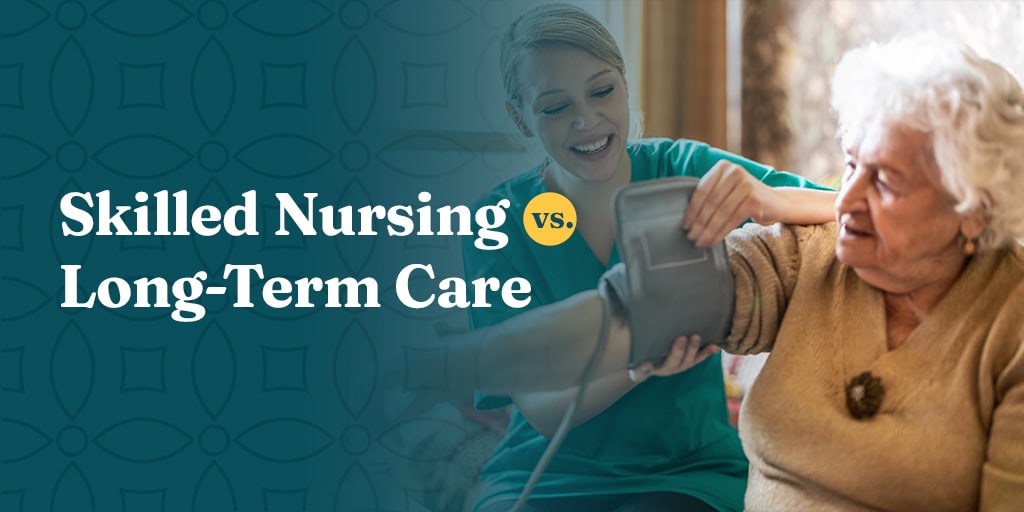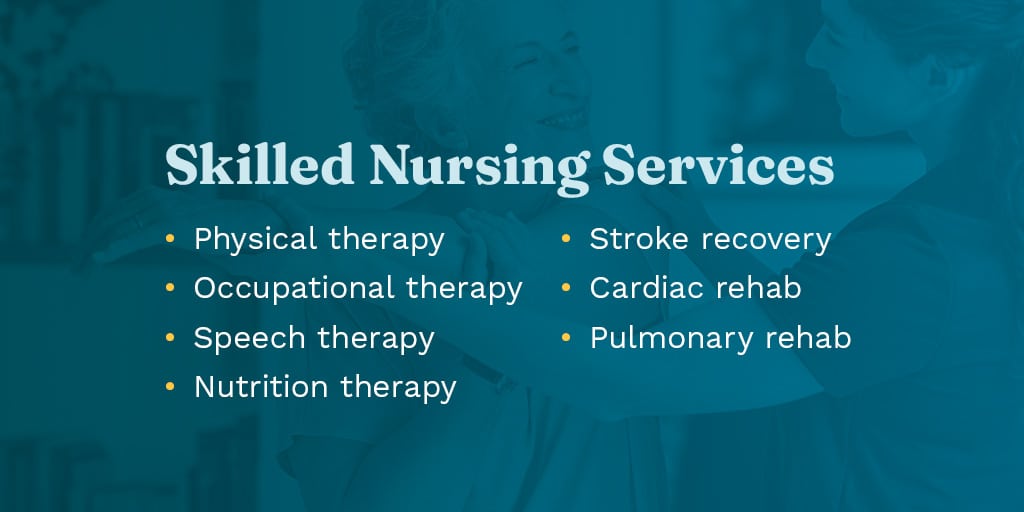Skilled Nursing vs. Long-Term Care


As people grow older, they often require more help, sometimes at home or at specialized care facilities. It can be an emotional experience for individuals and family members when that time comes. To make that time even more challenging, the terms used for types of senior care can be confusing.
What is skilled nursing care? What is long-term care? Who needs these types of care, and how do you decide what is right for your family? Knowing the answers to these questions can help you navigate senior care management and find the best care plan, simplifying the process.
What Is Skilled Nursing Care?
Skilled nursing care is daily care provided by registered nurses. This type of care is administered under a doctor’s orders and supervision. In many cases, skilled nursing care is given in a skilled nursing facility. This type of care is administered with the goal of eventually sending the patient home again.
Who Needs Skilled Nursing Care?
Patients who undergo surgery or have a medical condition that requires care during the recovery period may need skilled nursing care. For example, a patient who has undergone surgery and needs wound care may be a candidate for skilled nursing care. A patient who has had a stroke and needs physical therapy and speech therapy to help them to recover would need skilled nursing care, as well.
Examples of Skilled Nursing Services
Some of the common types of skilled nursing are:
- Physical therapy: Following a fall or surgery, older adults may need physical therapy to regain mobility. Skilled nursing care facilities can provide trained physical therapists to help patients recover their physical strength. The ultimate goal of physical therapy will be to help individuals recover and go home.
- Occupational therapy: Occupational therapy helps people adapt to the changes they may experience following an illness or injury. For example, an occupational therapist may help a patient learn how to feed or dress through a series of coordination exercises. This type of therapy is meant to help people be as active as possible when they return home after undergoing skilled nursing care.
- Speech therapy: Older adults may experience speech challenges following a medical event like a stroke. A speech therapist at a skilled nursing facility can help assess communication challenges and work with the individual to rebuild their language skills. A speech therapist can help their patients through exercises targeted at strengthening the muscles involved in speech.
- Nutrition therapy: Skilled nursing can help address nutritional needs related to specific conditions, such as stroke or congestive heart failure. Nutrition therapy can address healthy eating and strategies for receiving proper nutrition when a patient has difficulty swallowing.
- Stroke recovery: A stroke can have a significant impact on an individual’s mobility and speech. Skilled nursing is available specifically to help people recover from strokes and adapt to their environments. Post-stroke care can involve a multitude of therapies commonly offered in skilled nursing settings, including speech therapy and occupational therapy.
- Cardiac rehab: Following a heart attack, older adults may need to undergo cardiac rehabilitation. This kind of skilled nursing care can involve a variety of approaches to improving cardiovascular health. Exercise is an important part of cardiac rehab. Patients will also receive education on how to adopt behaviors to maintain heart health and manage stress.
- Pulmonary rehab: Adults with chronic lung conditions, such as pulmonary fibrosis, may experience periods of hospitalization. Doctors may recommend patients with lung conditions undergo a pulmonary rehabilitation program through a skilled nursing facility. This type of rehab will focus on managing chronic lung conditions and improving activity levels.

What Is Long-Term Care?
Long-term care is for people who need assistance with daily activities on an ongoing basis. While this type of service is provided by trained professionals, it doesn’t require the same level of medical expertise as skilled nursing care. Long-term care can be provided in dedicated facilities or at home, depending on the individual’s unique needs.
Examples of Long-Term Care
A few examples of long-term care include the following:
- Home care: When older adults need help with daily tasks, such as bathing and preparing meals, home care can be the answer. Someone from a dedicated home care team will come to the person’s home to help them with nonmedical tasks. This type of care helps adults to live with dignity while giving them the support they need. This term is often used interchangeably with home health care, but this type of care involves medical support, such as medication administration, in the home.
- Alzheimer’s and dementia care: When a loved one has Alzheimer’s disease or another type of dementia, caring for them at home alone can become difficult. As the individual experiences memory loss and communication, their need for outside care grows. Caregivers trained to work with Alzheimer’s disease and dementia patients can come to the home to assist with their daily care.
- Companion care: Not all long-term care is about providing activity and housekeeping support. Some people may find value in emotional support, as well. Companion care is ideal for older adults who feel lonely at home. Someone from a trusted companion care team will come to socialize and help out with small tasks, like running errands.
- Transition care: After a stay in the hospital, older adults might need help transitioning back to life at home. Once at home again, patients may be vulnerable to infection or falls. Transition care can help them reduce these risks and keep them at home instead of back in the hospital.
How Corewood Care Can Help
Everyone we work with has unique needs, and our team works with compassion to provide that essential care. We offer a broad selection of care services at Corewood Care, such as home care services, 24/7 in-home care, companion services, care management, Alzheimer’s care services and more. We aim to manage care needs to enable people to live their lives comfortably and gracefully.
If you are interested in learning more about our long-term care services, schedule a free home care assessment.




